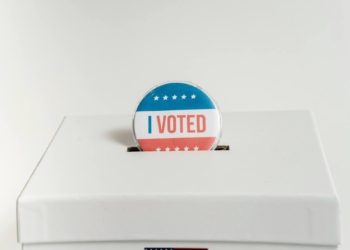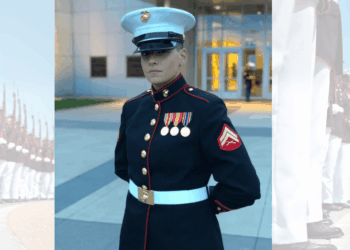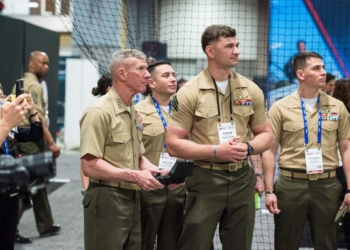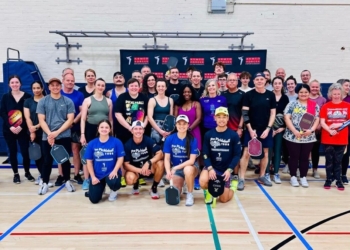The Elizabeth Dole Foundation announced its newest class of caregiver fellows, which include two family members currently caring for loved ones who served in the National Guard.
The 11 fellows join the 225 past and present Dole Caregiver Fellows who represent all 50 states, Puerto Rico, and the District of Columbia to bring attention to the tremendous challenges facing America’s 5.5 million hidden heroes, according to a press release. While the Foundation typically selects 25-30 fellows each year, this smaller group is focused specifically on the military caregivers who may have been underrepresented in past years. That included recognizing the unique challenges National Guard families experience as military caregivers.
“The reserve and Guard families don’t get the appreciation they deserve. Oftentimes, these individuals are activated and are doing long tours of service. The families are giving up so much. And when one of these service members is wounded, the families sometimes don’t have ample support. The Elizabeth Dole Foundation wants to bring more awareness to this, to elevate our Guard families with more recognition, support, and resources,” said Elizabeth Rotenberry, Fellows Program Manager for the Foundation.
Among those fellows is Jennifer Briest, of South Dakota, who cares for her husband, Corey. She says she was unfamiliar with military lingo and terminology 16 years ago.
“I didn’t consider myself a military spouse. My husband was in the National Guard. We weren’t living the military life day in and day out,” Briest said.
When Corey deployed to Iraq with the South Dakota National Guard for a second time, she didn’t have a Family Readiness Group or even live in a community with a military presence. Briest was just 23 when she went from being a wife, mother of two, and brand-new elementary school teacher to adding military caregiver to her list of titles.
“There was so much I didn’t understand,” Briest said.
Corey was injured in an IED blast on Dec. 4, 2005, that killed three of his fellow service members.
“When I got to his side, I saw how severe the injuries were, but it wasn’t until we got to the Minneapolis VA a month later that I realized caring for Corey was going to be my full-time job now. I needed to be there 24 hours a day.”
Briest said that day in December was life-altering in more ways than one, but she didn’t expect was how much the event would change her.
“If a person would have met me before Corey’s injuries — they would have described me as easy-going, very “go with the flow.” I’ve changed as a person. I’ve learned to be assertive and learned to speak up for the needs of Corey, and for the needs of other caregivers.”
While the road is not easy for anyone caring for a wounded warrior, Briest thinks their situation presented additional challenges.
“As a member of the National Guard, we feel like Corey fell through the cracks. The Guard felt like his care should fall under the Army and vice-versa,” Briest recalled.
As a 2021 Elizabeth Dole Fellow, she hopes to make things easier on reserve component families who may have to go down a similar road in the future.
“We can’t change what happened to us, but we can work to make this road a better one for the next family that has to go through this. There’s been so much red tape.”
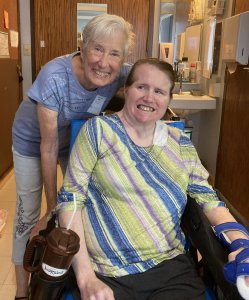
Fellow Christine Hahn, who cares for her daughter in Wisconsin, agrees.
“You’re in a constant mental battle mode. You’re always on guard, always looking for answers, always advocating for your loved one,” Hahn said.
Her daughter, Angie, was serving in the Wisconsin National Guard and was activated by the Army in 2008. It was then that Angie fell and hit her head while stationed at Fort Bragg, North Carolina. At 60, Hahn thought she was a few years from retirement when her daughter suffered a brain injury during surgery.
“We were bounced around constantly while the Army and Guard argued about who was responsible for Angie’s care,” she said.
That retirement came earlier than expected.
“I was missing too much work going to doctor’s appointments. Someone had to go with her that could ask and answer questions. Someone needed to be an advocate,” Hahn said.
She said it was other caregivers who told her she had a voice.
“Other patients’ families encouraged me to stand up for my daughter.”
As a fellow, Hahn says she hopes to help injured veterans get the physical and mental therapy they need.
“If I can accomplish that, I’ll be able to sleep at night. If you make the veteran’s life easier, life for the caregiver is easier,” she said.
The Elizabeth Dole Foundation hopes these National Guard caregiver voices bring about change.
“Our fellows are our advocates,” said Rotenberry. “Their stories helped shape the Elizabeth Dole Foundation and shape the work we’re doing every day through legislation, programming, and more.”
Additional 2021 Dole Caregiver Fellows include:
- Jose Alvarez-Santa Ana, California
- Ilihia Gionson-Kailua Kona, Hawaii
- Angelena Taylor-Detroit, Michigan
- April Mulvey-Birdsboro, Pennsylvania
- Georgette Wenton-Stroudsburg, Pennsylvania
- Debra Barker-Dayton, Texas
- Linda Mais-El Paso, Texas
- Candace Laguna-Temple, Texas
- Kristin Christensen-Everett, Washington



















